Lawyer for Critics Calls Action Illegal
Updated May 7
[btnsx id=”5768″]
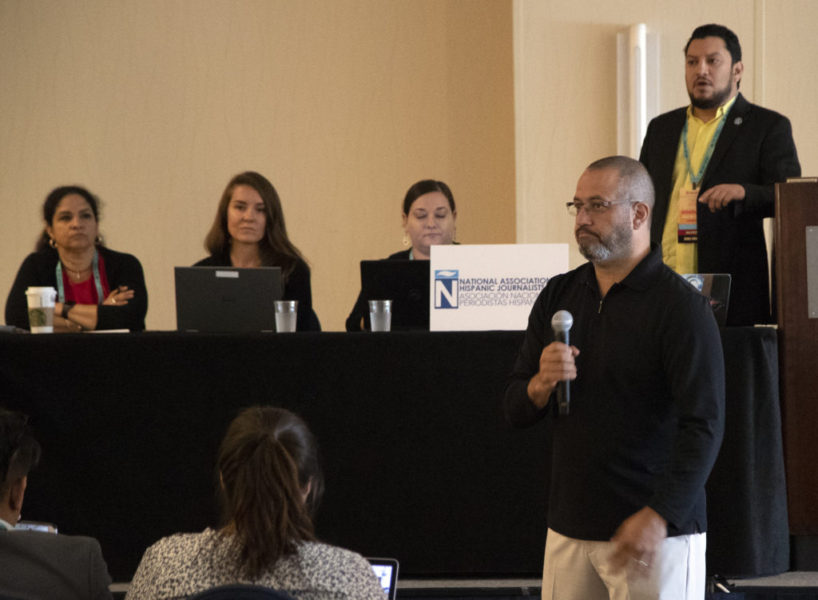
Lawyer for Critics Calls Action Illegal
The board of the National Association of Hispanic Journalists rebuffed critics and reiterated its decision to postpone the NAHJ elections this year, NAHJ announced Tuesday, putting the board at legal loggerheads with some of its most prominent members.
The board’s critics produced a letter from an attorney who wrote, “my legal opinion is that the NAHJ’s leadership’s decision to suspend elections and award themselves an additional year of office is illegal and ill-advised.”
Citing the “unpredictability” caused by the COVID-19 pandemic, the organization announced April 16, “After much consideration, the board voted to temporarily limit any unnecessary radical change in the interest of preserving a strong and effective organizational foundation.”
NAHJ President Hugo Balta said at the time, ““Basically every term is pushed by a year, that is to say everyone serving on the board right now will serve 3 years (and not 2).”
A letter from prominent Hispanic journalists followed, saying that the board’s actions violated NAHJ bylaws and “left out the voices of the people NAHJ was created to serve: its members.“
The letter was originally signed by 45 members, including 31 in the “lifetime” category, 12 Hall of Fame inductees, 11 former board members, seven former presidents, two founders and 11 other members, including student project leaders. Some had more than one distinction; other names were added later.
Balta messaged Journal-isms Tuesday that the board subsequently met in executive session by Zoom. While the NAHJ announcement said the meeting included “a robust discussion that included some concerns raised by members,” because the leaders were in executive session, “I am not allowed per the NAHJ bylaws to discuss in detail what was said” or to disclose the vote, Balta said.
“However, The NAHJ Board is united in its decision to serve the best interests of our organization during a period that threatens its existence.
“We re-evaluated many factors and included concerns raised by some members…all of which will be discussed at a virtual town hall meeting.”
The board’s reiteration was greeted with disappointment by its critics. “Your actions are not in the best interests of the association and violate the board’s fiduciary duties,” said a letter attributed to Rafael Olmeda, Marilyn Garateix, Nora Lopez, Frances Robles, Diana Fuentes and Veronica Villafane, all former board members, two of them former presidents.
A letter by lawyer Alison M. Steele of St. Petersburg, Fla., (pictured) on behalf of the critics, said:
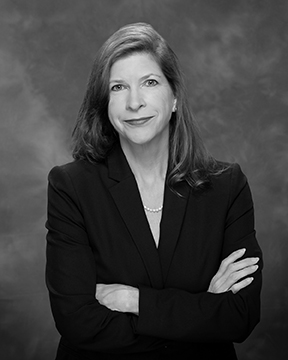 “I must respectfully disagree with NAHJ’s current leadership that the orderly conduct of elections as provided for by the organization’s governing documents represents ‘unnecessary radical change’ and that such action ‘preserv[es] a strong and effective organizational foundation.’ The action does just the opposite.
“I must respectfully disagree with NAHJ’s current leadership that the orderly conduct of elections as provided for by the organization’s governing documents represents ‘unnecessary radical change’ and that such action ‘preserv[es] a strong and effective organizational foundation.’ The action does just the opposite.
“First, as your leadership’s local newspapers will show — as mine, the Tampa Bay Times (also a client of this firm) certainly does – local governments, community development districts, and civic organizations are carrying on with business as usual within their various governing laws and documents. Such activities include the holding of public hearings on various issues, including actions on which various boards will be voting, using electronic communications media technology. There is no reason for NAHJ leadership to set it[self] apart from the rest of the functioning world.
“Second, the precedent leadership is establishing is astonishing. As we approach elections for national office in the United States, what precedent does it set for an organization of prestigious journalists to disregard its own governing documents and suspend its own elections in the name of ‘stability’? . . .”
NAHJ’s leadership said in its announcement that “the indecision with the annual gathering created an obsolete timeline per the current association bylaws,” a reference to the uncertainty about its annual convention because of the coronavirus pandemic. On April 24, NAHJ and the National Association of Black Journalists announced that their joint convention would now be held virtually.
“To mitigate similar predicaments during any future national crises, the discussion will include the exchange of ideas and proposed next steps to bring the organization’s bylaws up to present times,” the NAHJ statement said.
Pulitzers Honor ‘1619 Project’
May 4, 2020
Blacks Dominate Non-Journalism Categories
Cesar Conde to Lead NBC News; Andrew Lack Out
HBO Series on Child Murders Suggests KKK Role
Nominate a J-Educator Who Promotes Diversity
[btnsx id=”5768″]
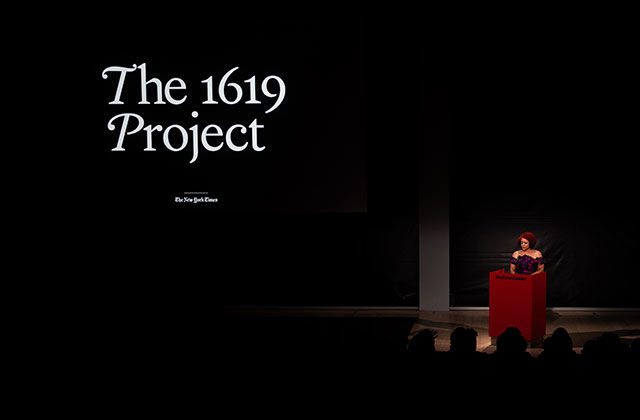
Blacks Dominate Non-Journalism Categories
Nikole Hannah-Jones won the Pulitzer Prize for commentary Monday for “Lessons of the 1619 Project,” the New York Times’ commemoration of the arrival of a ship carrying enslaved Africans to Virginia 400 years earlier.
The Pulitzer Board also voted a special citation for activist journalist Ida B. Wells, the anti-lynching crusader of the 19th and 20th centuries (1862-1931) who has gained renewed visibility in recent years, including as the namesake of a project training more people of color to become investigative journalists.
Hannah-Jones is a co-founder of that Ida B. Wells Society for Investigative Reporting.
“Ida B. Wells & I were awarded the Pulitzer on the same day,” Hannah-Jones tweeted. “How can I not believe that the ancestors intervened on this moment? I’ll say more later. For now I will sit in the truth of how she, how they, cleared a path for me, how they endured so that I & the #1619Project could be.”
The board said the citation for Wells comes with a bequest of at least $50,000 in support of Wells’ mission, with recipients to be announced.
“The 1619 Project” was among the year’s most significant journalism involving African Americans. It drew attacks from white conservatives such as former House Speaker Newt Gingrich, who called it propaganda, and black ones such as Robert Woodson, who created the “1776 Initiative” to counter what he called its portrayal of blacks as “victims.” But others snapped up copies.
In her winning essay, Hannah-Jones wrote, “. . . it would be historically inaccurate to reduce the contributions of black people to the vast material wealth created by our bondage. Black Americans have also been, and continue to be, foundational to the idea of American freedom. More than any other group in this country’s history, we have served, generation after generation, in an overlooked but vital role: It is we who have been the perfecters of this democracy. . . .”
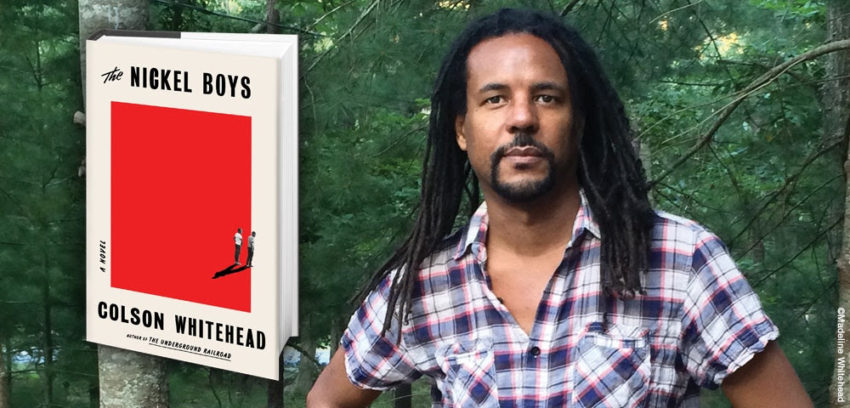
In another bow to African American history, novelist Colson Whitehead won the prize for fiction for “The Nickel Boys,” which the publisher said on its release was “Based on the real story of a reform school in Florida that operated for one hundred and eleven years and warped the lives of thousands of children.”
Whitehead also won the Pulitzer in 2017 for “The Underground Railroad,” which judges called “a smart melding of realism and allegory that combines the violence of slavery and the drama of escape in a myth that speaks to contemporary America.“
Abuse of children in state custody is not behind us. “Florida continues to consign children to the sensory deprivation and unceasing loneliness of solitary confinement. As if the Department of Juvenile Justice still regards sadism as a best practice,” Fred Grimm wrote in November in the South Florida Sun-Sentinel.
In a statement issued through his publisher, Doubleday, Whitehead said the news of his winning Monday was “pretty nuts!,” the Associated Press reported.
“Obviously I’m very honored and I hope that it raises awareness of the real life model for the novel — The Dozier School for Boys — so that the victims and their stories are not forgotten,” he said.
The Courier Journal in Louisville, Ky., won the Pulitzer for coverage of former Kentucky Gov. Matt Bevin’s pardons issued in his last week in office.
It won for “its rapid coverage of hundreds of last-minute pardons by Kentucky’s governor, showing how the process was marked by opacity, racial disparities and violations of legal norms.”
Among other issues for which Bevin has been criticized are rolling back voting rights for the formerly incarcerated.
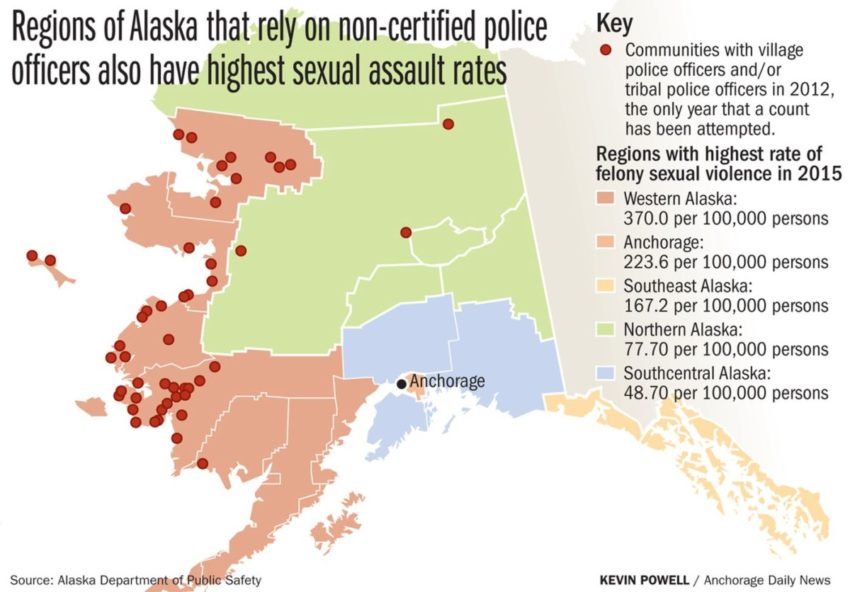
The top award — for public service — went to the Anchorage Daily News, with contributions from ProPublica, for “a riveting series that revealed a third of Alaska’s villages had no police protection, took authorities to task for decades of neglect, and spurred an influx of money and legislative changes.”
The Daily News’ Kyle Hopkins wrote in the series, “The dilemma is part of a two-tier criminal justice system in Alaska where people born and raised in isolated villages are not given the same basic protections as those in cities. Advocates for Alaska Native rights argue state and federal lawmakers refuse to prioritize spending on public safety for rural communities while courts have failed to protect village residents.
“The problem is widespread. At least 75 villages have no police whatsoever, according to the Indian Law & Order Commission. . . .”
Thrilled that @thisamerlife just won the very first #Pulitzer Prize ever given to audio journalism. For this episode: https://t.co/AKnJEm21UA
— Ira Glass (@iraglass) May 4, 2020
In the new audio category, the staff of “This American Life” won, with Molly O’Toole of the Los Angeles Times and Emily Green, freelancer, Vice News. The entry was “The Out Crowd,” “revelatory, intimate journalism that illuminates the personal impact of the Trump Administration’s ‘Remain in Mexico’ policy.” The new category was said to recognize the growing importance of podcasts in the media landscape.
“The Associated Press won the feature photography prize for images made during India’s clampdown on Kashmir, where a sweeping curfew and shutdowns of phone and internet service added to the challenges of showing the world what was happening in the region,” Jennifer Peltz reported for the Associated Press.
“AP photographers Dar Yasin, Mukhtar Khan and Channi Anand snaked around roadblocks, sometimes took cover in strangers’ homes and hid cameras in vegetable bags to capture images of protests, police and paramilitary action and daily life. Then they headed to an airport to persuade travelers to carry the photo files out with them and get them to the AP’s office in New Delhi. . . .”
Lalo Alcaraz, a freelancer who also draws the strip “La Cucaracha,” was a finalist for editorial cartooning, “for irreverent and poignant cartoon commentary focused on local and national issues from a distinctly Latinx perspective.” Barry Blitt, contributor to The New Yorker, won.
Other finalists of color include Chloé Cooper Jones, freelancer; Rosanna Xia and Swetha Kannan of the Los Angeles Times; Dieu Nalio Chery and Rebecca Blackwell of the Associated Press; the staff of Reveal from The Center for Investigative Reporting, led by Matt Thompson; Soraya Nadia McDonald of The Undefeated; Nestor Ramos of The Boston Globe; and Rahsaan “New York” Thomas and Earlonne Woods, who contributed stories about incarceration.
 In books, drama and music categories, “Sweet Taste of Liberty: A True Story of Slavery and Restitution in America,” by W. Caleb McDaniel (pictured) won in the history category. It is a “masterfully researched meditation on reparations based on the remarkable story of a 19th century woman who survived kidnapping and re-enslavement to sue her captor,” the judges said.
In books, drama and music categories, “Sweet Taste of Liberty: A True Story of Slavery and Restitution in America,” by W. Caleb McDaniel (pictured) won in the history category. It is a “masterfully researched meditation on reparations based on the remarkable story of a 19th century woman who survived kidnapping and re-enslavement to sue her captor,” the judges said.
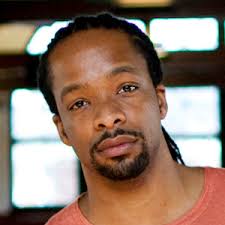 Jericho Brown (pictured) won in the poetry category for “The Tradition,” a “collection of masterful lyrics that combine delicacy with historical urgency in their loving evocation of bodies vulnerable to hostility and violence.”
Jericho Brown (pictured) won in the poetry category for “The Tradition,” a “collection of masterful lyrics that combine delicacy with historical urgency in their loving evocation of bodies vulnerable to hostility and violence.”
Michael R. Jackson won in drama for “A Strange Loop,” a “metafictional musical that tracks the creative process of an artist transforming issues of identity, race, and sexuality that once pushed him to the margins of the cultural mainstream into a meditation on universal human fears and insecurities.”
Anthony Davis won in music for his opera “The Central Park Five,” about five African American and Latino teenagers who were in the wrong place at the wrong time. “They were unjustly convicted of a Central Park rape but exonerated through DNA evidence thirteen years later. Davis’ opera is a passionate story about an issue that still rocks America today,” the judges said.
- Darryl Fears was part of the Washington Post climate and environment team that won for explanatory reporting (Facebook) (series)
- William Greaves, filmmaker: Ida B Wells: A Passion For Justice; The Memoirs of Ida B. Wells read by Toni Morrison (video)
- Morgan Greene, Chicago Tribune: Ida B. Wells receives Pulitzer Prize citation: ‘The only thing she really had was the truth’
- Tom Jones, Poynter Institute: Nikole Hannah-Jones’ essay from ‘The 1619 Project’ wins commentary Pulitzer
- Kimbriell Kelly edited the Los Angeles TImes’ winning entry for audio reporting, “This American Life.” (Twitter)
- Ishena Robinson, The Root: Nikole Hannah-Jones, Creator of the New York Times’ 1619 Project, Awarded 2020 Pulitzer Prize
Cesar Conde to Lead NBC News; Andrew Lack Out
“NBC News chief Andy Lack is out following a corporate restructuring announced Monday that places Telemundo executive Cesar Conde (pictured) in charge of NBC News, MSNBC and CNBC,” David Bauder reported Monday for the Associated Press.
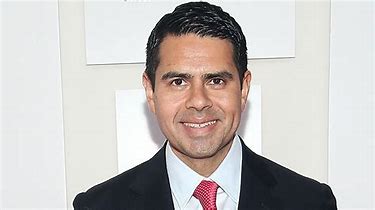 “Born in Miami, Conde is of Cuban and Peruvian descent,” according to a 2017 biography by Tom Huddleston Jr. in Time. “After graduating from Harvard and Wharton, he did stints at a startup and a bank but was always drawn to TV (he says he saw mass media’s power for good when ‘used responsibly’). He joined Univision in 2003, became president, and jumped ship to NBC in 2013. . . .”
“Born in Miami, Conde is of Cuban and Peruvian descent,” according to a 2017 biography by Tom Huddleston Jr. in Time. “After graduating from Harvard and Wharton, he did stints at a startup and a bank but was always drawn to TV (he says he saw mass media’s power for good when ‘used responsibly’). He joined Univision in 2003, became president, and jumped ship to NBC in 2013. . . .”
Hugo Balta, president of the National Association of Hispanic Journalists, messaged Journal-isms, “Cesar Conde being named to oversee NBCUniversal’s news operations is testament to his proven successful record as a leader and to [the] NBC and Comcast commitment to diversity, inclusion and equity.”
Bauder continued, “Lack’s departure was revealed when Jeff Shell, new NBC Universal CEO, outlined a new corporate governance plan. Besides Conde’s elevation, Shell is giving broad new powers over NBC’s entertainment properties to Mark Lazarus, who has overseen NBC Sports.
“The 72-year-old Lack has had two runs as head of NBC News, the first as NBC News president from 1993 to 2001, and he rejoined the company as news chairman in 2015. . . .
“The news division was embarrassed, however, when Ronan Farrow took his reporting on disgraced Hollywood executive Harvey Weinstein to the New Yorker and complained his bosses at NBC showed little interest in his work. NBC said Farrow’s material wasn’t ready to be aired. . . .
“Lack’s signing of Fox News Channel’s Megyn Kelly to a big-money deal turned out to be a high-profile failure. . . .
“Conde’s appointment as chairman of the NBC Universal News Group puts him in charge of NBC News, MSNBC and CNBC. Under the old structure, Lack did not oversee CNBC. The individual presidents, Noah Oppenheim at NBC News, Phil Griffin at MSNBC, and Mark Hoffman at CNBC, remain. . . .”
He is married to Pamela Silva Conde, co-anchor of Univision’s popular weekday news magazine, “Primer Impacto,” news organizations have reported.
Stephen Battaglio and Meg James added in the Los Angeles Times, “Conde, 46, joined NBCUniversal in October 2013 as an executive vice president overseeing the company’s international and digital businesses, but he eventually segued into a role running Telemundo. Before coming to NBCUniversal, Conde was president of the rival Univision.
“ ‘Cesar’s valuable and relevant experience leading broadcast networks and news divisions, combined with his high degree of integrity and proven management skills, make him the right person to lead our news group into the future,’ Shell said in a statement. . . .”
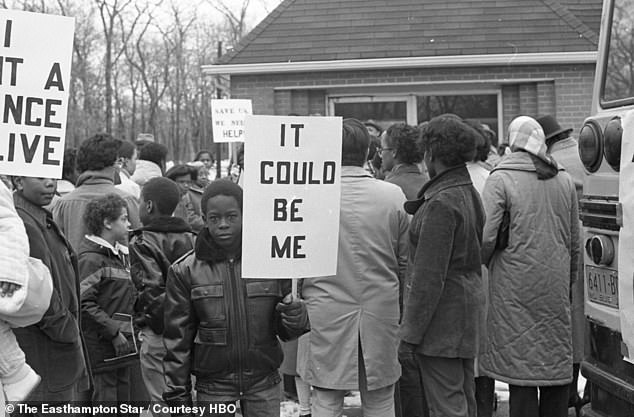
HBO Series on Child Murders Suggests KKK Role
The five-part HBO docuseries “Atlanta’s Missing and Murdered: The Lost Children” concluded Sunday by pointing to other possible suspects “that include brothers linked to the Ku Klux Klan, a pedophile ring, and in one of the cases, a local man,” Dusica Sue Malesevic reported over the weekend for Dailymail.com.
“From around July 1979 until May 1981, Atlanta’s black community was terrorized by a serial killer or killers that were murdering kids, teens and young adults,” the Daily Mail explained.
“In February 1982, Wayne Williams was convicted of killing two adults and linked to several other cases. The police and city declared case closed.
“Questions remain more than 40 years later, including the number of victims — at least 24 black kids and teens and six young adults — and who should be included.
“The cases have been reopened before and most recently in March 2019.
“‘We really wanted Atlanta to be another character,” Maro Chermayeff, the executive producer, told DailyMail.com. “How the city handled the crime was very important.”
“Chermayeff explained the series wanted to look at the city’s underbelly that included pornography and a pedophile ring,” the story continued.
“The Klan was also active and present. From the 1940s to the ’60s, Klan members were part of the police, according to the series. And while [Maynard] Jackson was the city’s first black mayor who worked to integrate the police department, the shadow of the Klan and the black community’s distrust of law enforcement persisted, according to the series.”
Camille Bell, mother of the slain Yusuf Bell, “points out the victims were poor and black. She says: ‘We were finding that the city was taking the attitude of your kids are dead and we don’t care. I contend that the Atlanta Police Department couldn’t catch a cold.’ “
Among the journalists interviewed on camera were Karl Evanzz, author of books about Malcolm X and the Nation of Islam and a former Washington Post researcher; Clem Richardson, who worked at the Daily News in New York and at the Atlanta Journal-Constitution, Maynard Eaton, a former television reporter who teaches at Clark Atlanta University, and Monica Kaufman Pearson, retired longtime television anchor.
They said that “the city too busy to hate” was sensitive about tarnishing its image and eager to close the case.
- Casey Cep, New Yorker: When James Baldwin Wrote About the Atlanta Child Murders
- Ronda Racha Penrice, NBC News: HBO’s ‘Atlanta’s Missing and Murdered’ series reveals how little black lives matter
Nominate a J-Educator Who Promotes Diversity
Beginning in 1990, the Association of Opinion Journalists, formerly the National Conference of Editorial Writers, annually granted a Barry Bingham Sr. Fellowship — actually an award — “in recognition of an educator’s outstanding efforts to encourage minority students in the field of journalism.”
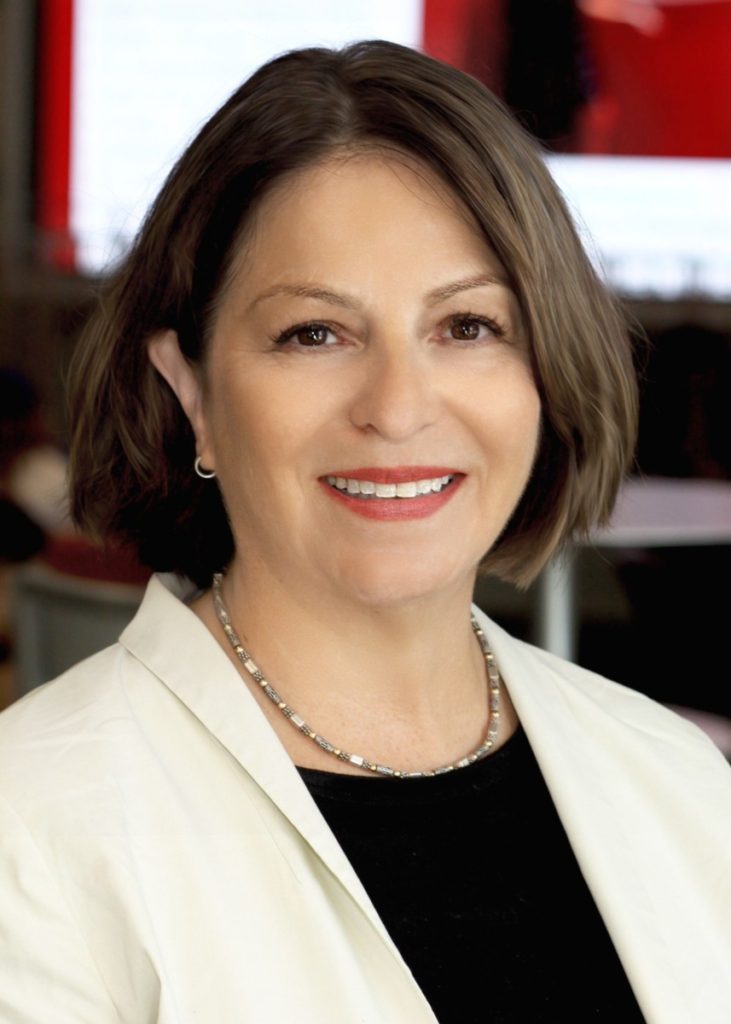
AOJ merged in 2016 into the American Society of News Editors, which as the News Leaders Association is continuing the Bingham award tradition.
Since 2000, the recipient has been awarded an honorarium of $1,000 to be used to “further work in progress or begin a new project.”
Past winners include James Hawkins, Florida A&M University (1990); Larry Kaggwa, Howard University (1992); Ben Holman, University of Maryland (1996); Linda Jones, Roosevelt University, Chicago (1998); Ramon Chavez,University of Colorado, Boulder (1999); Erna Smith, San Francisco State (2000); Joseph Selden, Penn State University (2001); Cheryl Smith, Paul Quinn College (2002); Rose Richard, Marquette University (2003).
Also, Leara D. Rhodes, University of Georgia (2004); Denny McAuliffe, University of Montana (2005); Pearl Stewart, Black College Wire (2006); Valerie White, Florida A&M University (2007); Phillip Dixon, Howard University (2008); Bruce DePyssler, North Carolina Central University (2009); Sree Sreenivasan, Columbia University (2010); Yvonne Latty, New York University (2011); Michelle Johnson, Boston University (2012); Vanessa Shelton, University of Iowa (2013); William Drummond, University of California at Berkeley (2014); Julian Rodriguez of the University of Texas at Arlington (2015) (video); David G. Armstrong, Georgia State University (2016) (video); Gerald Jordan, University of Arkansas (2017) ,Bill Celis, University of Southern California (2018) and Laura Castañeda, University of Southern California (2019).
Nominations may be emailed to Richard Prince, Opinion Journalism Committee, richardprince (at) hotmail.com. The deadline is May 17. Please use that address only for NLA matters.
[btnsx id=”5768″]
Facebook users: “Like” “Richard Prince’s Journal-isms” on Facebook.
Follow Richard Prince on Twitter @princeeditor
Richard Prince’s Journal-isms originates from Washington. It began in print before most of us knew what the internet was, and it would like to be referred to as a “column.” Any views expressed in the column are those of the person or organization quoted and not those of any other entity. Send tips, comments and concerns to Richard Prince at journal-isms-owner@yahoogroups.com
View previous columns (after Feb. 13, 2016).
- Diversity’s Greatest Hits, 2018 (Jan. 4, 2019)
- Book Notes: Is Taking a Knee Really All That? (Dec. 20, 2018)
- Book Notes: Challenging ’45’ and Proudly Telling the Story (Dec. 18, 2018)
- Book Notes: Get Down With the Legends! (Dec. 11, 2018)
- Journalist Richard Prince w/Joe Madison (Sirius XM, April 18, 2018) (podcast)
- Richard Prince (journalist) (Wikipedia entry)
- February 2018 Podcast: Richard “Dick” Prince on the need for newsroom diversity (Gabriel Greschler, Student Press Law Center, Feb. 26, 2018)
- Diversity’s Greatest Hits, 2017 — Where Will They Take Us in the Year Ahead?
- Book Notes: Best Sellers, Uncovered Treasures, Overlooked History (Dec. 19, 2017)
- An advocate for diversity in the media is still pressing for representation, (Courtland Milloy, Washington Post, Nov. 28, 2017)
- Morgan Global Journalism Review: Journal-isms Journeys On (Aug. 31, 2017)
- Diversity’s Greatest Hits, 2016
- Book Notes: 16 Writers Dish About ‘Chelle,’ the First Lady
- Book Notes: From Coretta to Barack, and in Search of the Godfather
- Journal-isms’ Richard Prince Wants Your Ideas (FishbowlDC, Feb. 26, 2016)
- “JOURNAL-ISMS” IS LATEST TO BEAR BRUNT OF INDUSTRY’S ECONOMIC WOES (Feb. 19, 2016)
- Richard Prince with Charlayne Hunter-Gault,“PBS NewsHour,” “What stagnant diversity means for America’s newsrooms” (Dec. 15, 2015)
- Book Notes: Journalists Follow Their Passions
- Book Notes: Journalists Who Rocked Their World
- Book Notes: Hands Up! Read This!
- Book Notes: New Cosby Bio Looks Like a Best-Seller
- Journo-diversity advocate turns attention to Ezra Klein project (Erik Wemple, Washington Post, March 5, 2014)
![]()

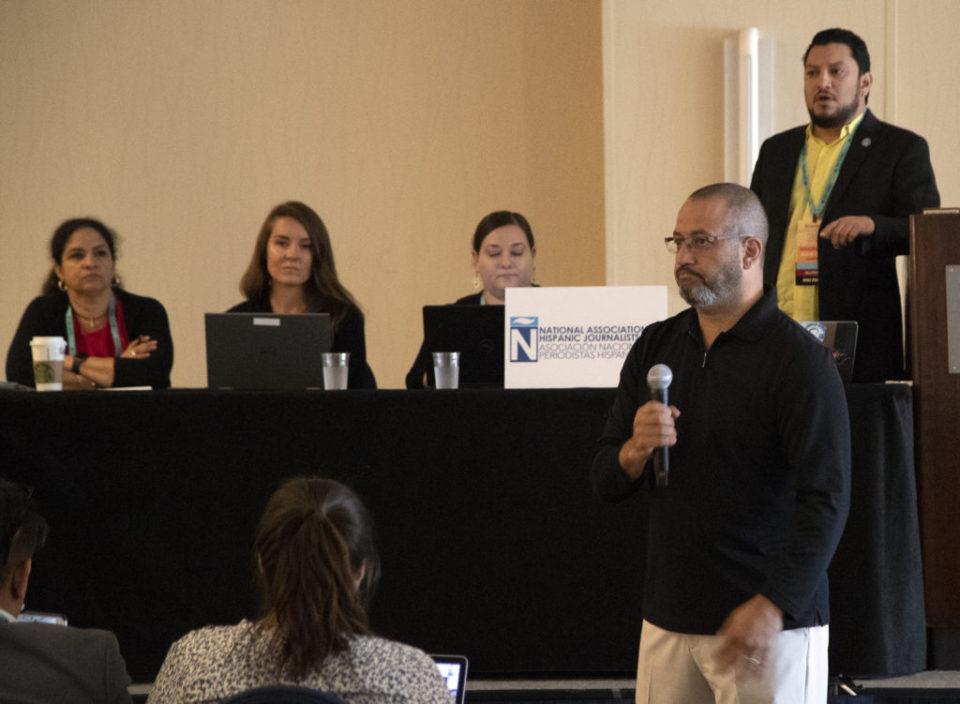
4 comments